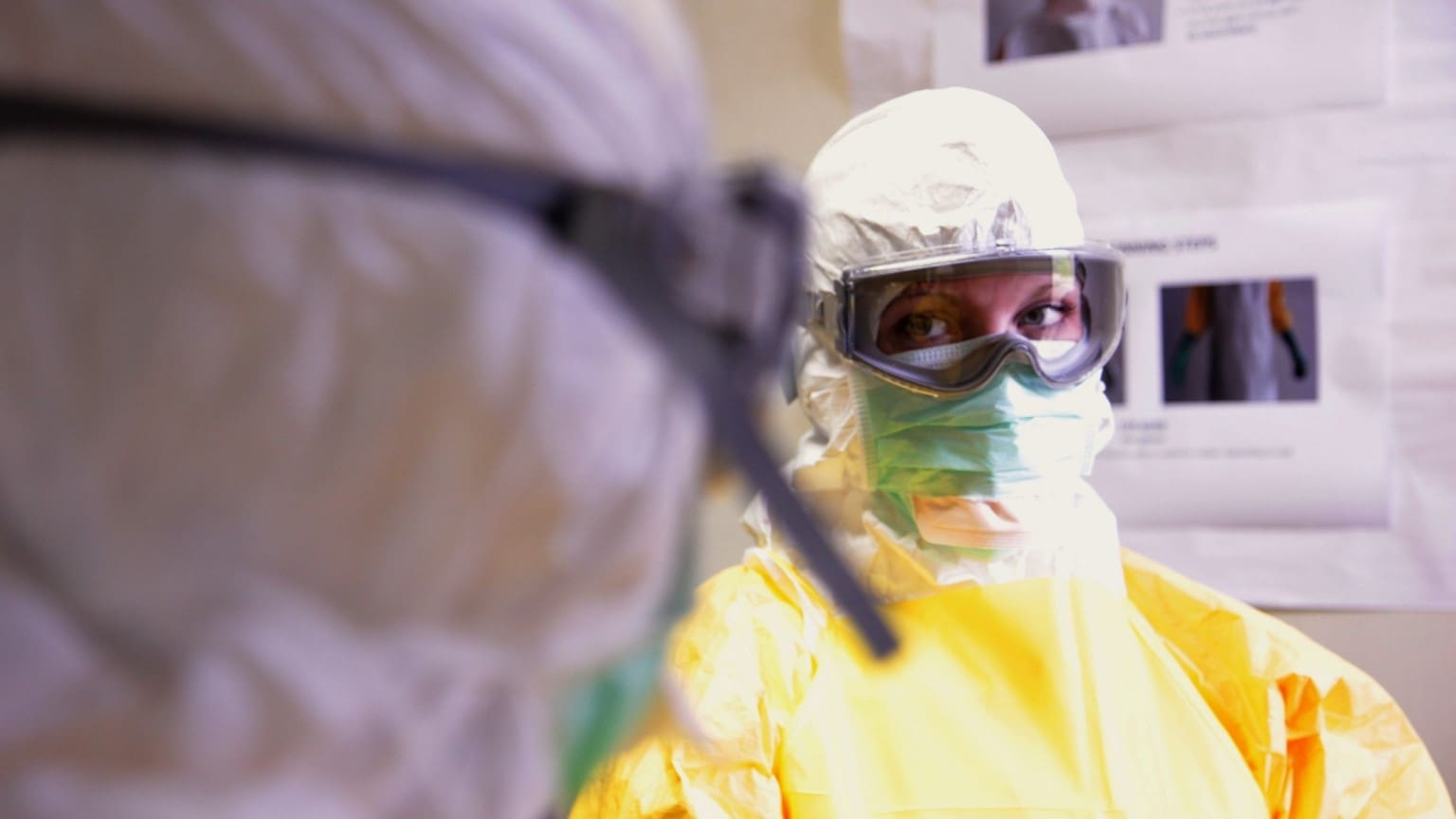On September 27th, Rwanda declared the Marburg disease outbreak and reported 15 deaths so far. This is Rwanda’s first-ever outbreak of the deadly virus and already the third largest ever. Should we be concerned? And what about travelers?
Update:
On 20 December 2024, the Ministry of Health of Rwanda and the WHO declared the end of the Marburg virus disease (MVD) outbreak. They did so after two incubation periods with no new cases.
However, there’s a new, so far smaller outbreak in Tanzania, with one confirmed case as of January 20th, 2025. To read the CDC travel notice click here.
In This Article
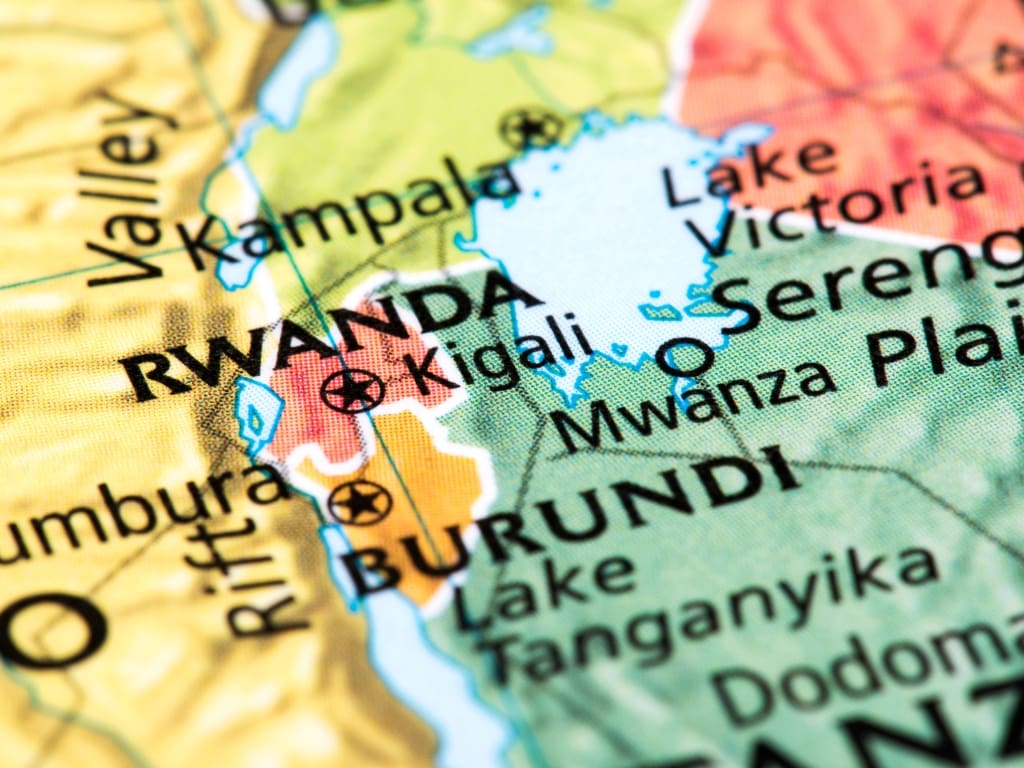
Transmission
The Marburg virus shares many characteristics with Ebola, making it a serious concern.
This outbreak probably started with a human getting infected by a fruit bat. This transmission typically occurs in a cave or a mine where the bat lives by contact with saliva, urine, or feces of the bat.
Human-to-human transmission is possible after the onset of symptoms by blood, broken skin, secretion, other bodily fluids, or materials contaminated by them.
Because the transmission occurs when in close contact with an infected person, healthcare workers are at the highest risk. In Rwanda, 80% of confirmed cases were in a staff of two hospitals in Kigali.
Symptoms
The symptoms usually occur abruptly and include high fever, headache, malaise, and muscle aches.
On the third day and later, severe diarrhea, abdominal cramps, and vomiting begin, and sometimes rash can be present too.
From the fifth day, bleeding from the nose, gums, or vagina may develop, and blood can be present in vomit and feces as well. This is called hemorrhagic fever. It’s typical for Ebola, too, and can progress to shock and end with death.
Marburg is fatal in 22% to 88% of infected patients, with an average of 50%. It depends on supportive care and early detection, as no special treatment exists. In Rwanda, the number has been 24% so far.
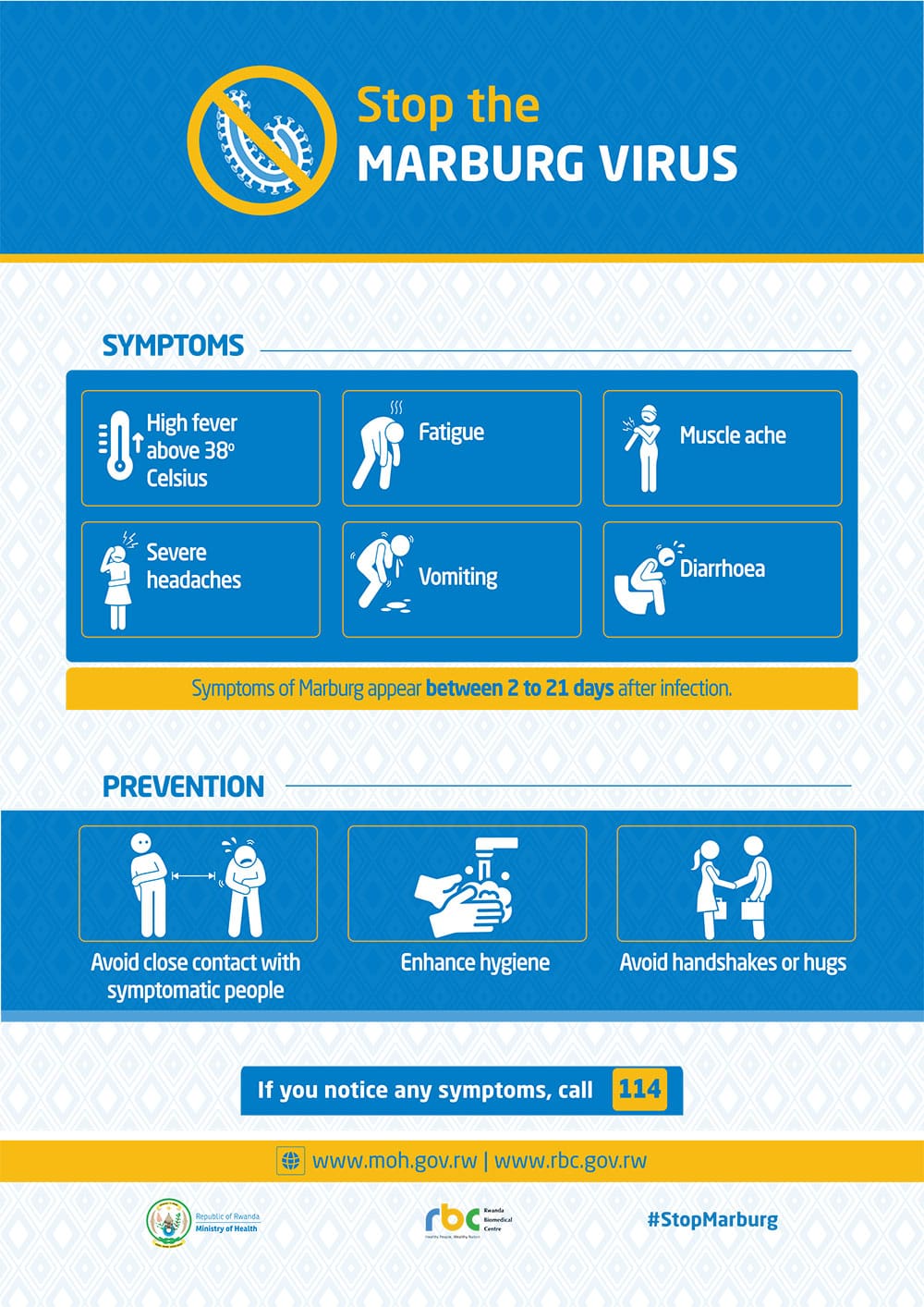
Current situation
Health authorities have confirmed 15 deaths and 46 recoveries, with only two active cases remaining as of October 24th. The most recent case was confirmed on October 23rd after a week without any new cases.
The fact that this is the largest Marburg outbreak since 2005 in Angola might be because a large testing capacity is available and a strong public health response is in place. This contrasts previous outbreaks, where the underreporting of cases probably took place.
Over 5,000 tests have been conducted, and more than a thousand doses of investigational vaccine have been administered to healthcare workers.
The number of cases has dropped rapidly, and hopefully, it will only get better from now on. However, vigilance and the continuation of the current public health effort are necessary to stop the outbreak.
The outbreak can be declared over after 42 days with no cases reported (two maximum incubation periods for the virus).
Travel recommendations from authorities
WHO – World Health Organization
WHO advised against any travel and trade restrictions on October 10th. They rely on robust public health measures and the response of the Rwandan government, including tracing, testing, and isolating suspected contacts.
Confirmed cases are treated in isolated centers. According to WHO, there is no evidence of community transmission, and all the new cases reported are within Kigali hospitals. Health workers from two health facilities in Kigali account for over 80% of confirmed cases.
World Health Organization (WHO) Director-General Dr. Tedros Adhanom Ghebreyesus visited Rwanda on October 20th and urged countries to reverse travel restrictions.
„These restrictions are unnecessary and can harm Rwanda’s economy. They bring no benefit, only harm.“ he said.
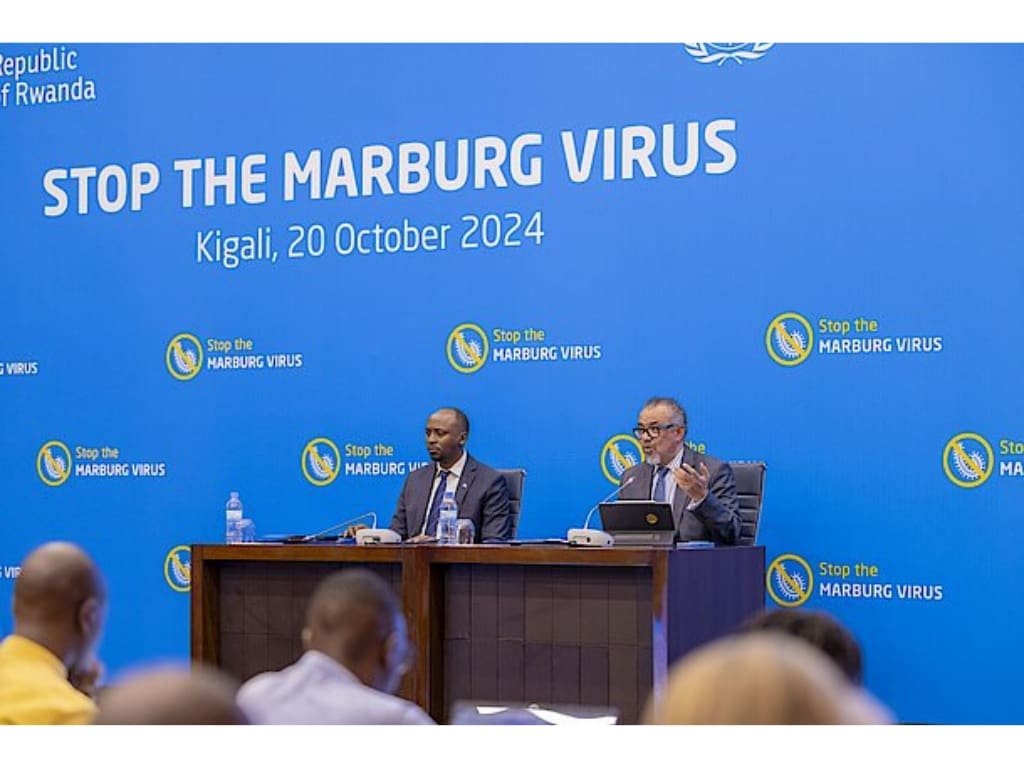
ECDC - European Centre for Disease Prevention and Control
The risk assessment statement regarding travel measures recommends that no travel restrictions be imposed on EU/EEA citizens traveling to Rwanda in the context of this outbreak.
Together with WHO, they support exit screening (when leaving Rwanda) rather than entry screening.
UK National Travel Health Network and Centre recommends extra precautions.
CDC - US Centers for Disease Control and Prevention
CDC assigned travel health notice level 3 to Rwanda, which advised to reconsider all nonessential travel.
The reason provided is that the cases have been reported in several districts, not just in one city or area.
The USA also implemented quite harsh restrictions, which mandate that all U.S.-bound passengers departing from Rwanda be routed to one of the following designated airports: New York (JFK), Chicago (ORD), or Washington, DC (IAD) for enhanced traveler health entry screening. They cooperate with airlines to change flights for passengers with tickets booked to other US airports.
Rwanda Ministry of Health
There are currently no travel restrictions, and all key tourist destinations, including Volcanoes National Park, Akagera National Park, Gishwati Mukura National Park, and Nyungwe National Park, are fully operational.
Travelers can expect routine temperature checks and hand sanitizing stations at hotels, restaurants, tourist sites, airports, and other border crossings.
All passengers exiting the country will also undergo a short symptom-screening questionnaire before departure.
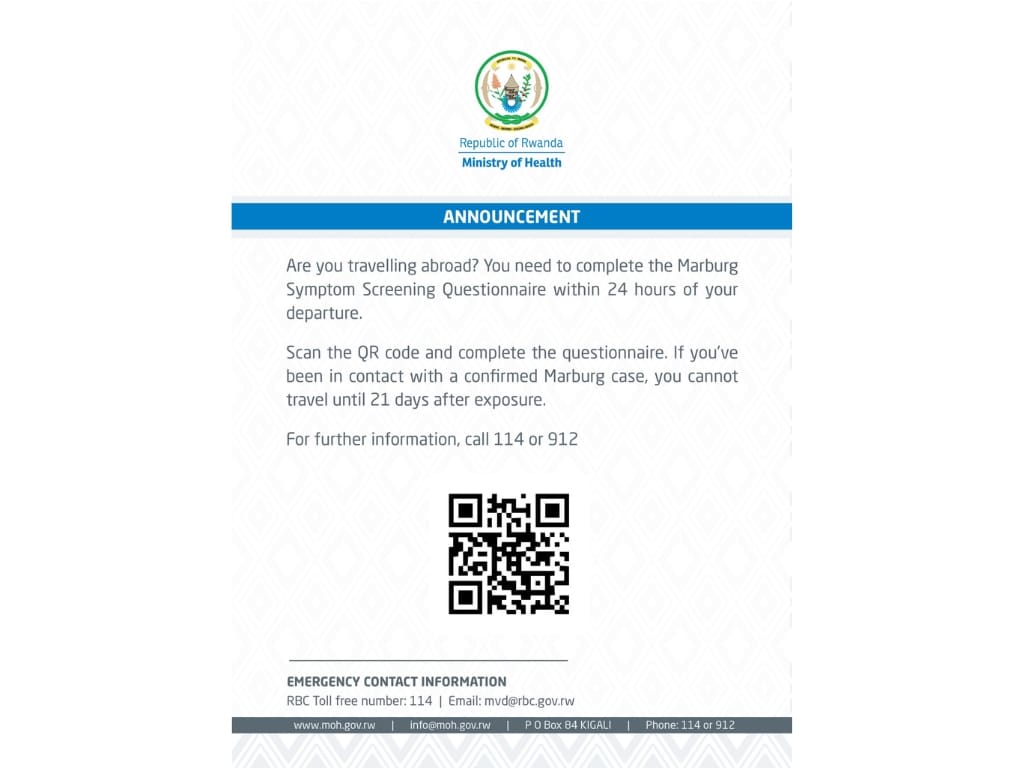
Advice for travelers
The risk of infection for the average traveler to Rwanda remains extremely low.
However, extra precautions are needed at the time of the outbreak.
- Consider Travel insurance
- Avoid contact with sick people and their bodily fluids, avoid funerals and burials, avoid nonurgent visits to health care facilities, avoid caves and mines because of bats, avoid primates, avoid visiting traditional healers, avoid eating bushmeat, avoid unsafe sexual activities, wash hands regularly using soap
- Register here if you’re a US citizen or at your local foreign ministry register before departing
Monitor your health in Rwanda and for 21 days after coming back, and if any of the Marburg symptoms arise, contact local health authorities.
Call first, state that you’ve been traveling to Rwanda, and isolate yourself. The virus can be confirmed quickly from a blood test using PCR.
Please take into account that the situation is changing rapidly, and the information in this article might not be up to date after publication. Check the CDC website for the latest news or your local foreign ministry updates.
I’ve contacted SafetyWing about their insurance policy in this situation. You can check the details about the coverage on Reddit.
However, keep in mind each insurance company has its own policy.
Resources
https://www.who.int/en/news-room/fact-sheets/detail/marburg-virus-disease
https://wwwnc.cdc.gov/travel/notices/level3/marburg-rwanda
https://rw.usembassy.gov/health-alert-u-s-embassy-kigali-6/
https://apnews.com/article/rwanda-marburg-outbreak-e84410d7a216543a1f6252b3c568ec7e
https://publichealth.jhu.edu/2024/marburg-virus-outbreak-in-rwanda
https://www.sabin.org/resources/sabin-dispatches-additional-vaccines-to-rwanda-for-marburg-outbreak/
https://www.nature.com/articles/d41586-024-03275-8
https://travelhealthpro.org.uk/news/799/marburg-virus-disease-in-rwanda
https://www.fitfortravel.nhs.uk/news/newsdetail.aspx?id=24767
https://www.moh.gov.rw/news-detail/rwandas-marburg-virus-response-progress-and-resilience
Disclaimer:
The information provided in this blog post is for general informational and educational purposes only and is not a substitute for professional medical advice. Always consult your physician or other qualified healthcare provider with any health problem. The use or reliance on any information provided in this blog post is solely at your own risk.


